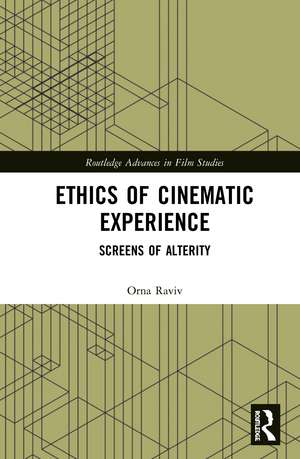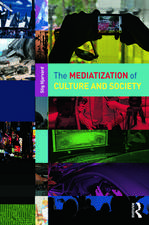Ethics of Cinematic Experience: Screens of Alterity: Routledge Advances in Film Studies
Autor Orna Raviven Limba Engleză Hardback – 25 oct 2019
Through a close examination of the ethical relevance of the philosophy of Maurice Merleau-Ponty, Stanley Cavell, Emmanuel Levinas and Gilles Deleuze to cinema studies, Ethics of Cinematic Experience: Screens of Alterity pursues the question of how film can open the viewer to what is not her, and so bring her to encounter otherness in a way that is unique to cinematic experience. The book sees ethics as not just the subject, content or story of a film but part of its aesthetic structure. Accompanied by readings of films mainly from mainstream cinema, each chapter focuses on a different aspect of the encounter with alterity through cinema. The book gives particular attention to how theoretical discussion of the cinematic close-up can lead to ethical insights into the status of both the human and the non-human in film, and thus lead to an understanding of the relationships the viewer makes with them.
The book is a helpful resource for students and scholars interested in the relationship between philosophy, film and ethics, and is appropriate for students of philosophy and media and cultural studies.
| Toate formatele și edițiile | Preț | Express |
|---|---|---|
| Paperback (1) | 367.28 lei 43-57 zile | |
| Taylor & Francis – 30 sep 2021 | 367.28 lei 43-57 zile | |
| Hardback (1) | 1000.27 lei 43-57 zile | |
| Taylor & Francis – 25 oct 2019 | 1000.27 lei 43-57 zile |
Din seria Routledge Advances in Film Studies
-
 Preț: 319.20 lei
Preț: 319.20 lei -
 Preț: 310.14 lei
Preț: 310.14 lei -
 Preț: 349.02 lei
Preț: 349.02 lei -
 Preț: 301.93 lei
Preț: 301.93 lei -
 Preț: 310.65 lei
Preț: 310.65 lei -
 Preț: 310.85 lei
Preț: 310.85 lei -
 Preț: 313.47 lei
Preț: 313.47 lei -
 Preț: 372.42 lei
Preț: 372.42 lei -
 Preț: 356.77 lei
Preț: 356.77 lei -
 Preț: 349.10 lei
Preț: 349.10 lei - 18%
 Preț: 1106.81 lei
Preț: 1106.81 lei -
 Preț: 416.06 lei
Preț: 416.06 lei - 18%
 Preț: 1116.02 lei
Preț: 1116.02 lei -
 Preț: 449.05 lei
Preț: 449.05 lei -
 Preț: 388.85 lei
Preț: 388.85 lei - 18%
 Preț: 1112.21 lei
Preț: 1112.21 lei - 18%
 Preț: 1112.34 lei
Preț: 1112.34 lei - 18%
 Preț: 1106.81 lei
Preț: 1106.81 lei - 18%
 Preț: 1106.85 lei
Preț: 1106.85 lei -
 Preț: 382.86 lei
Preț: 382.86 lei -
 Preț: 475.65 lei
Preț: 475.65 lei -
 Preț: 441.20 lei
Preț: 441.20 lei -
 Preț: 387.31 lei
Preț: 387.31 lei - 18%
 Preț: 729.62 lei
Preț: 729.62 lei - 18%
 Preț: 1056.95 lei
Preț: 1056.95 lei - 18%
 Preț: 1058.43 lei
Preț: 1058.43 lei - 18%
 Preț: 1161.62 lei
Preț: 1161.62 lei - 30%
 Preț: 848.15 lei
Preț: 848.15 lei - 18%
 Preț: 1109.99 lei
Preț: 1109.99 lei - 18%
 Preț: 1054.43 lei
Preț: 1054.43 lei -
 Preț: 398.48 lei
Preț: 398.48 lei - 18%
 Preț: 1117.43 lei
Preț: 1117.43 lei - 18%
 Preț: 1115.51 lei
Preț: 1115.51 lei - 18%
 Preț: 1114.30 lei
Preț: 1114.30 lei - 18%
 Preț: 1053.16 lei
Preț: 1053.16 lei - 18%
 Preț: 1057.75 lei
Preț: 1057.75 lei - 30%
 Preț: 820.32 lei
Preț: 820.32 lei - 18%
 Preț: 1112.34 lei
Preț: 1112.34 lei - 18%
 Preț: 1057.75 lei
Preț: 1057.75 lei - 18%
 Preț: 1117.43 lei
Preț: 1117.43 lei
Preț: 1000.27 lei
Preț vechi: 1219.84 lei
-18% Nou
Puncte Express: 1500
Preț estimativ în valută:
191.46€ • 208.04$ • 160.93£
191.46€ • 208.04$ • 160.93£
Carte tipărită la comandă
Livrare economică 21 aprilie-05 mai
Preluare comenzi: 021 569.72.76
Specificații
ISBN-13: 9781138370685
ISBN-10: 1138370681
Pagini: 174
Ilustrații: 16
Dimensiuni: 152 x 229 x 15 mm
Greutate: 0.45 kg
Ediția:1
Editura: Taylor & Francis
Colecția Routledge
Seria Routledge Advances in Film Studies
Locul publicării:Oxford, United Kingdom
ISBN-10: 1138370681
Pagini: 174
Ilustrații: 16
Dimensiuni: 152 x 229 x 15 mm
Greutate: 0.45 kg
Ediția:1
Editura: Taylor & Francis
Colecția Routledge
Seria Routledge Advances in Film Studies
Locul publicării:Oxford, United Kingdom
Public țintă
Postgraduate and UndergraduateCuprins
Introduction
Chapter One: Perspectivalism and Beyond
Chapter Two: Point of View
Chapter Three: The Cinematic Type
Chapter Four: The Face and the Close-Up
Chapter Five: The Face and the Close-Up—Take 2
Chapter Six: Becoming Machine
Chapter Seven: Cinema’s Responsibilities
Chapter One: Perspectivalism and Beyond
Chapter Two: Point of View
Chapter Three: The Cinematic Type
Chapter Four: The Face and the Close-Up
Chapter Five: The Face and the Close-Up—Take 2
Chapter Six: Becoming Machine
Chapter Seven: Cinema’s Responsibilities
Notă biografică
Orna Raviv is a filmmaker and a film theorist. She is an assistant teaching professor at the Unit for History and Philosophy of Art, Design and Technology, Shenkar College, and a teaching fellow at the Philosophy Department of Haifa University.
Descriere
This book examines the relationship between cinema and ethics from a philosophical perspective. It argues that theoretical discussion of the cinematic experience and more specifically of the cinematic close-up, can lead to ethical insights into the status of both the human and the non-human in film.























